Standards Fun.
- ISO
- IEC
- ITU
- WSC
- ANSI (in the US)
- IEEE
- ECMA
- IDPF
- W3C
- IETF
- WHATWG
- Kronos
- MPEG
- X
- ITU
- etc
- etc
- etc
There are a lot of "standards bodies"
- National Standards Bodies
- International Standards Bodies
- Recognized Standards Bodies
- Kinda recognized not exactly standards bodies
- Consortia
- Experts Groups
- Foundations
There are lots of "flavors" of how standards are made...
They are all the same in some ways, and very different in others
And they change.

Why?
(a meta diversion...)

Scale

We only solve the problems we have.
You don't need to think about time the same way if this is your practical scale
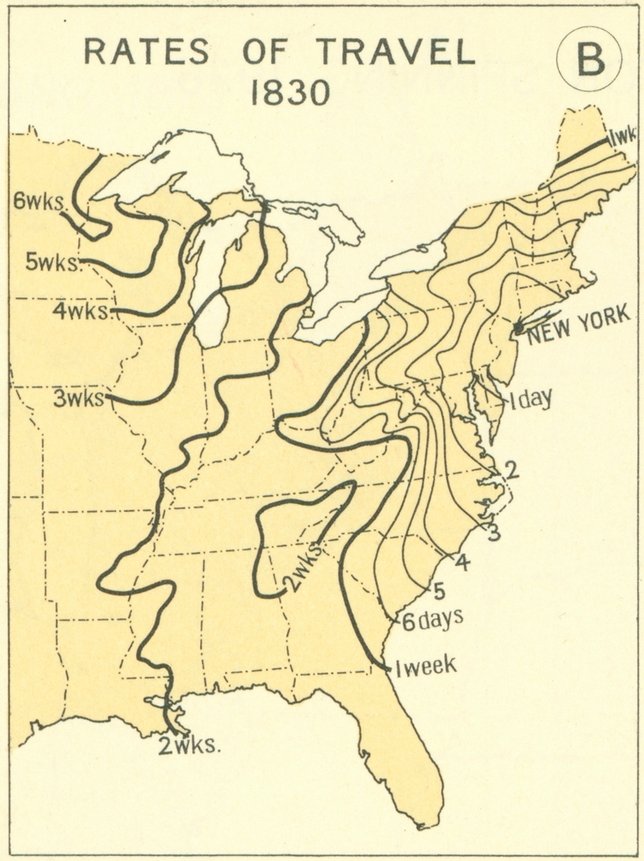
~1800's: Industrialization
-
Steam Power
-
Semaphore Communications
-
Rotary engines
-
Telegraph
-
Railroad
-
Telephone

Number of Standards Bodies on the Planet
0

This is hard to manage for everyone.
Lack of standardization is a literal
train-wreck.


Interop on a grand scale gets important relatively fast.


New things require new language

1903: 1500 buildings burned in Great Baltimore Fire
The fire fighting equipment uses over 600 variants of hose size/couplings.
Competition run amok
~1900
Engineering Associations
National Standards Bodies
~1915
~1950
Business Groups
International Standards Bodies
Networking
IETF
~1980
W3C
~1995
ECMA
~2005
WHATWG
"The commons"
slow.
Not cheap.
Very long life.
Can't break.
The internet: 50
The web: 30
The problem space itself changes!
- About 90% of Fortune 500 companies 50 years ago are gone or radically changed.
- Netscape
- Mosaic
- Opera
- Internet Explorer
- Free software/open source
- Netscape -> Mozilla is the origin
- The first half of the web was all proprietary implementation, as of Jan 2020, all major ones are open-source
- New devices / stakeholders







Where JavaScript the language and related efforts are standardized.

Where CSS, accessibility, internationalization, XR, many browser APIs and more are standardized

Where HTML and DOM are standardized.
We'll focus on these, and what they do today...

Technical committees

-
A committee of Ecma, with…
-
JS developers
-
JavaScript engines
-
Transpilers
-
Frameworks, libraries
-
Academics
-
etc
TC39
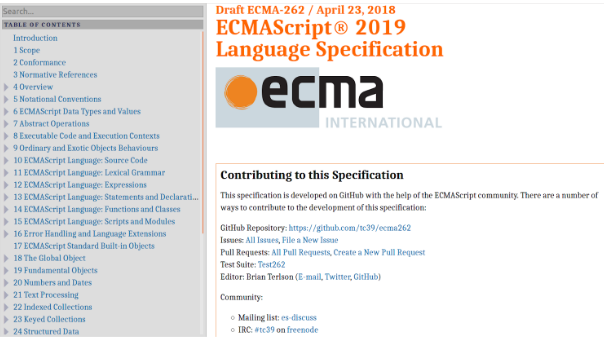
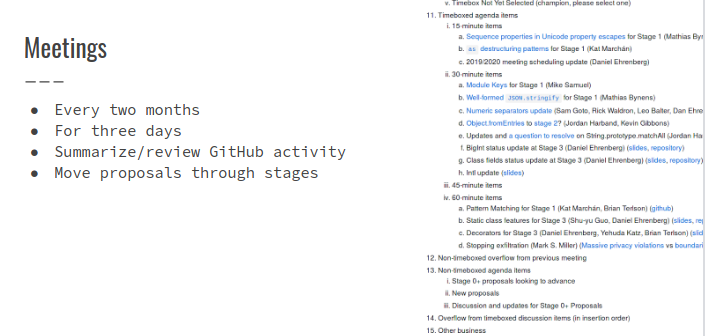
h/t to littledan
h/t to littledan
-
Stage 1: An idea under discussion
-
Stage 2: We're doing this and have a first draft
-
Stage 3: Basically final draft; ready to go
-
Stage 4: 2+ implementations, tests ⇒ standard
All standards bodies have some "stages" concept that is intended convey some to ~"degrees of real/stable/done"
... but it can be very different.
Giagianticus Corp
Warez 'R' Us
University of Research
Agency on Beauracracy
"Consortium Model"
Paid for by membership

Two special roles
"Director" and "CEO"
You have to be a legal entity to join
.... but....
It's not a legal entity itself
.... but....
It will be...
... maybe...
Members define how the W3C Works
"The Process"
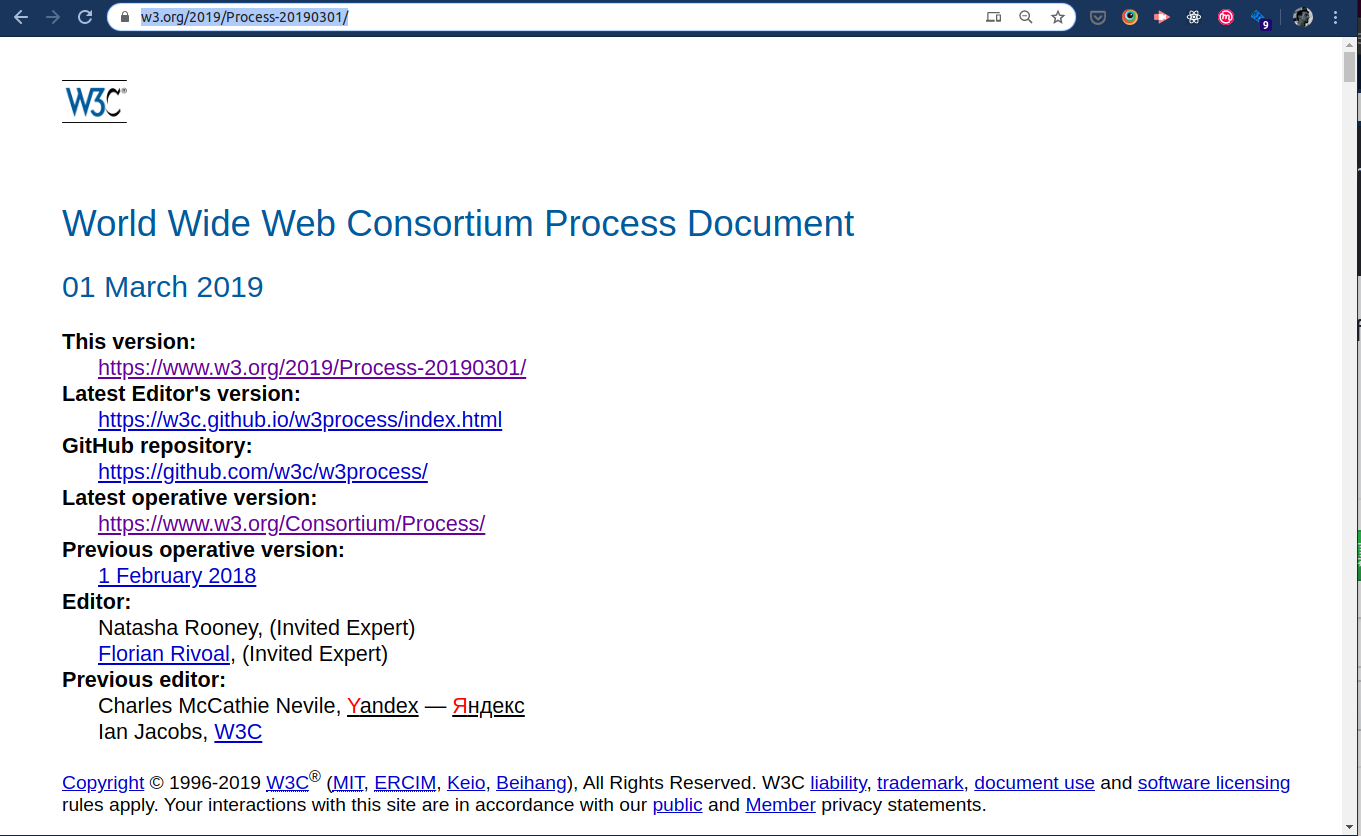
~ Representative democracy
Advisory Board
Advisory Board
9 Members
5 Elected
3 Appointed by the chair
1 permanent chair: the CEO
Advisory Board
11 Members
7 Elected
3 Appointed by the chair
?? a chair
Technical Architecture Group
(TAG)
Similar idea except chaired permanently by the director
Tim Berners-Lee

?? and then...
TBD...

1 Advisory Committe Rep Per Member
(ours is Juanjo)
1 Member, 1 Vote
We have the same "say" as Google... kinda.
Anyways...
complicated, subject to change
charter
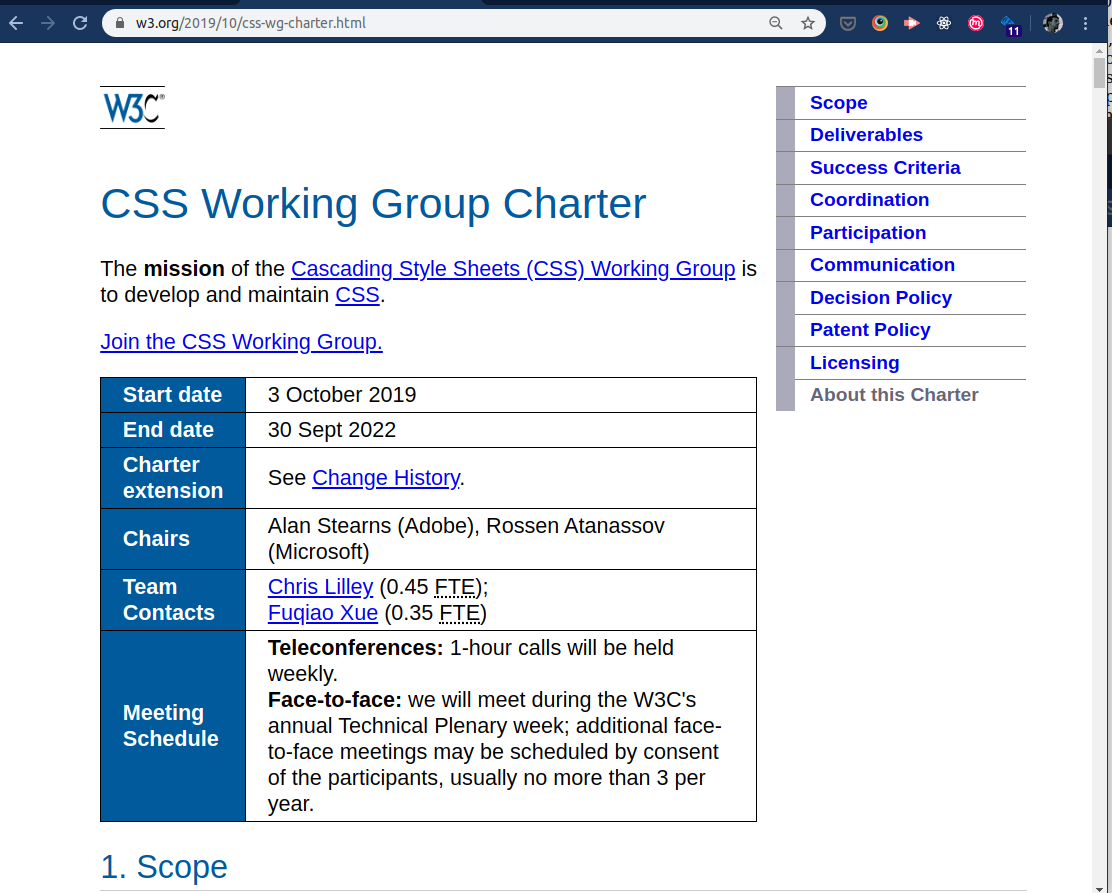
charter -> AC?

Juanjo... WDYT?
Staffing of Working Groups
ACs may appoint 0...N people to participate in a working group.
When they do, they sign off on representation/basic IP issues.
Working Group
Working Groups can work on any document within their charter.
- ?? Proposal
- First Public Working Draft
- Candidate Recommendation
- Proposed Recommendation
- Recommendation
"Stages"
At each step

Working Group Members?
At each step

...Juanjo? (AC Rep)
"Recommendations"
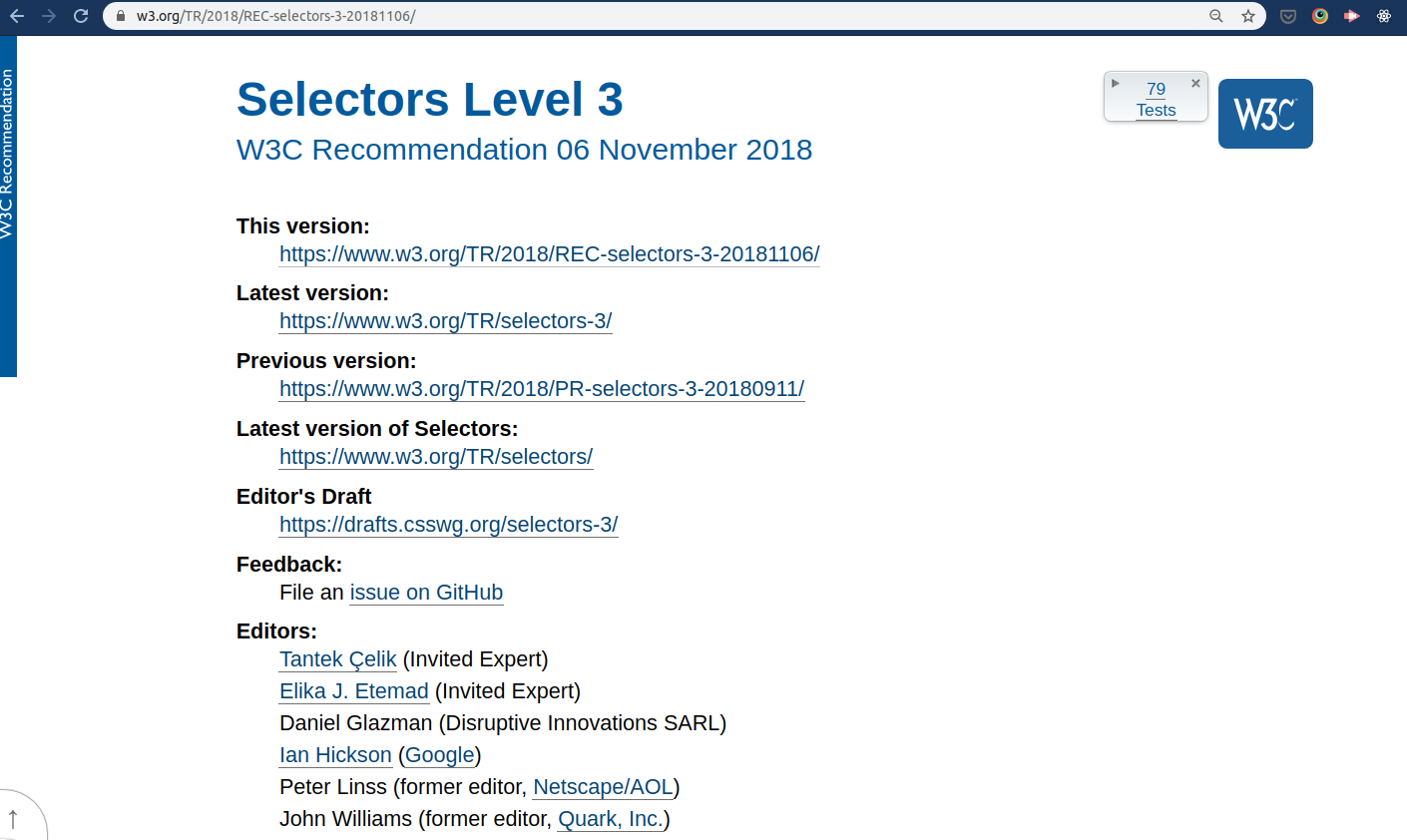
Wait, is it a standard?

Meh.
- "Working Groups"
-
Mailing ListGithub - "Regular" teleconfs
- "Regular" face-to-face
-
What people imagine...
High qualification requirements


Real qualification requirements... technicaly:
"Someone who paid money appointed you"
... but why?
- ~500 member orgs
- 3 web rendering engines + a few more "browsers"
- Overwhelming majority of WG members
- Overwhelming participation
- A few non-web "other" engines
- Everybody else
- Joins to stay abreast
- Joins for marketing/contact reasons
- Joins wide-eyed hoping to change something

One more "kind" of working group member...
The people who paid take a vote to invite someone...

Invited Expert
I am going to change the world!
Giagianticus Corp
Warez 'R' Us
University of Research
Agency on Beauracracy
Invited Expert
"Invited Experts" in reality
- It's time consuming
- It's slow
- Everyone has topics
- It's probably harder than you think
- Doesn't map well to your "real job" usually
- The most work happens in person...
- Who is paying for your travel/time off work?
Everything is open
Anyone can be involved...
In practice... the economics of participation in this model are hard and heavily slanted toward orgs with direct economic interest/ability to priortize the work

Game changer..
before we got here...
(and the other one)
This web is flawed, we will create the "real" web now.

</html>

So many proposals - lots of theory & "equality"
XML was the bedrock.

SOAP? WDSL? BPEL? XSD?
"REST"




developers kept pushing the web we had forward..
{ "what-about": "this" }
- Doug Crockford, one day.
JSON I CHOOSE YOU

Web 2.0 is here
And it's defined by developers, not W3C
??????????????????????????


June 2004 and everyone is like...
Web 3.0?
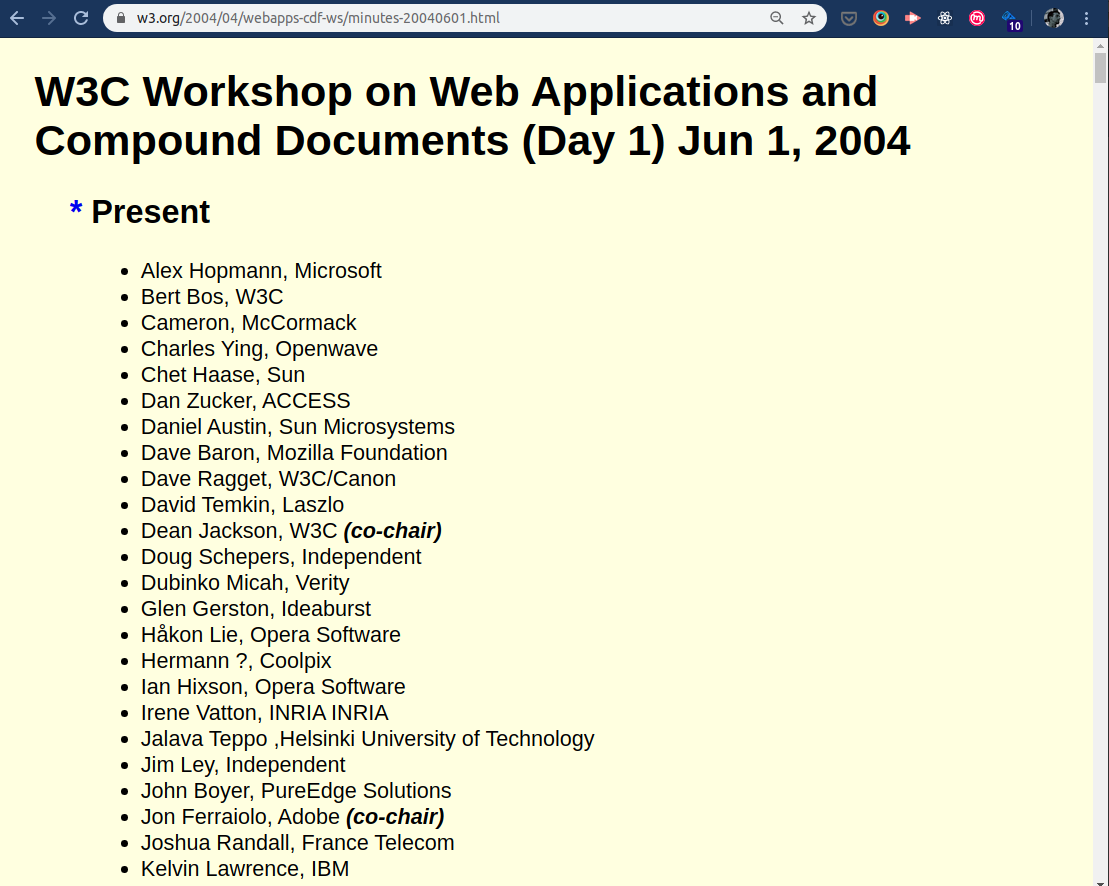

HTML... for medium level application requirements?
June 2004, W3C workshop...
Ian Hickson, Opera
"Hixie"
Let's vote.
AC reps?

Nope.
Apple
Mozilla
Aim:
Bring together
implementers
to try to bring
some of the good bits
along
WHATWG

Opera
...but avoid
the bad bits
The Decider
WHATWG

Realistically, just changes the bad bits
The Decider
WHATWG



W3C...

Soul searching
and reform...

Ultimately, developers choose the standard
Community Groups
Business Groups
Basic IP / Infrastructure for "Birds of a Feather" discussion
????
WICG: Web Incubator Community Group
"How to get to Stage 0 and 1"

- Reduced noise/better expectaions:
- not in WG
- expect failures
- Focused
- topic based
- encourages polyfills
- rapid feedback/iteration
WHATWG has a proper charter/process for holding accountable bad editors...
WhatWG
- HTML (2)
- DOM (1)
- CSS / Houdini
- Lots of other stuff
W3C
- HTML
- DOM
- "Web Components"
- HTML (3)
- DOM (2)
- "Web Components"
- URL (2)
- fetch
- streams
- https
- web packaging
- URL (1)
- HTML (1)
IETF

Thank you for attending my TED Talk..
Web Standards
By Brian Kardell
Web Standards
The basic stuff about standards
- 812



